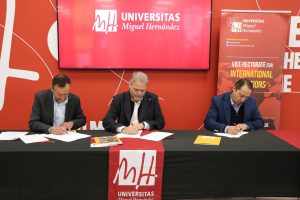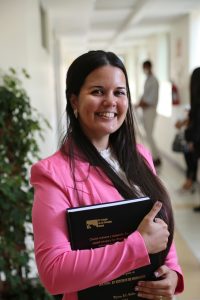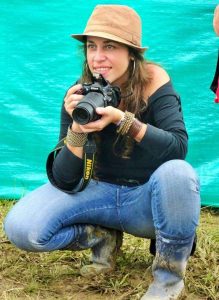Journalists Loraine Morales & Andrea Aldana, first beneficiaries of ‘Elche, Safe Space for Freedom of the Press’ program
3 May 2023
To commemorate World Press Freedom Day, the recipients of the ‘Elche, Safe Space for Freedom of the Press’ program, promoted by the Vice Rectorate for International Relations at the Miguel Hernández University of Elche (UMH), Reporters without Borders, and the Elche City Hall, have been announced. The first beneficiaries of this initiative are journalists, Loraine Morales (Cuba) and Andrea Aldana (Colombia).
 Program applicants included Mexican, Cuban, Salvadoran, Nicaraguan, Guatemalan, Colombian, Venezuela, and Puerto Rican journalists in situations of risk. The judging committee, led by the president of RSF Spain, Alfonso Bauluz, along with associate professor of journalism and Deputy Vice Rector for International Relations at the UMH, José Luis González Esteban, determined the suitability of the selected profiles.
Program applicants included Mexican, Cuban, Salvadoran, Nicaraguan, Guatemalan, Colombian, Venezuela, and Puerto Rican journalists in situations of risk. The judging committee, led by the president of RSF Spain, Alfonso Bauluz, along with associate professor of journalism and Deputy Vice Rector for International Relations at the UMH, José Luis González Esteban, determined the suitability of the selected profiles.
Loraine Morales studied journalism at Hermanos Saiz Montes de Oca University, in Pinar del Río (Cuba), and then completed a master of Population Studies at the University of La Habana. After her university education, she began collaborating at official and independent Cuban media, and her current work in Mexican exile as community and information manager from the ‘Migrar’ project stands out, which is part of one of the most professional and leading media, such as the case of elToque. For her part, Andrea Aldana is a research journalist, trained at the University of Antioquia (Colombia). She is currently a columnist in exile and collaborator of legal investigations at the Colombian newspaper, El Espectador, and she forms part of the editorial committee of newspaper, Universo Centro.
 As Loraine Morales explains, “In recent years I have been limited in terms of my work as a journalist, given that I do not enjoy the necessary freedom in either Cuba or Mexico, due to the political harassment resulting from me exercising my function as independent journalist and investigator. However, this has not diminished my commitment with the truth and justice, and I am convinced that journalism is a fundamental tool for promoting democracy and respect for human rights.” For her part, Andrea Aldana comments on her current situation: “Due to my profession, I am currently in exile due to threats I received because of my investigations on the corruption and illegal activities of the previous Attorney General of Colombia. I have been accused by the national army, but I will continue working in exile.”
As Loraine Morales explains, “In recent years I have been limited in terms of my work as a journalist, given that I do not enjoy the necessary freedom in either Cuba or Mexico, due to the political harassment resulting from me exercising my function as independent journalist and investigator. However, this has not diminished my commitment with the truth and justice, and I am convinced that journalism is a fundamental tool for promoting democracy and respect for human rights.” For her part, Andrea Aldana comments on her current situation: “Due to my profession, I am currently in exile due to threats I received because of my investigations on the corruption and illegal activities of the previous Attorney General of Colombia. I have been accused by the national army, but I will continue working in exile.”
Morales was forced to leave Cuba, setting up in Tijuana, where she has combined her work for elToque (the entire newsroom is outside of Cuba) with her graduate studies, receiving a doctorate in migration studies by the Colegio de la Frontera Norte, in Tijuana-Baja California (Mexico). She is a member of the Network of the Americas on Disappeared Migrants, a member of the Latin American and Caribbean Association of Border Studies, and a member of the Humanizing Deportation project by UC Davis (USA). As for Aldana’s journalistic trajectory, it should be noted that for more than 15 years she has covered topics related to the armed conflict, organized crime, drug trafficking, and violations of human rights in Colombia, which has earned her outstanding international professional recognition.
 The main objective of the program is to defend the freedom of the press by supporting persecuted journalists, and allowing them to temporarily abandon the location where the risk has been recognized. To accomplish this, the UMH and the Elche City Hall offer a safe space from which the chosen journalists may continue with their journalistic tasks, as well as contributing to the training of future journalists through workshops scheduled in the Dual Bachelor’s in Audiovisual Communication and Journalism. Both journalists will arrive at the UMH Elche Campus in September. Their stays will last one semester, and their stays will also include chats with professionals, groups, neighbors, etc., to show first hand the complexities of being a journalist in countries such as Cuba, Mexico, and Colombia. These countries continue to remain in a critical situation in the annual ranking of freedom of the press, published today, May 3 by the RSF, on World Press Freedom Day.
The main objective of the program is to defend the freedom of the press by supporting persecuted journalists, and allowing them to temporarily abandon the location where the risk has been recognized. To accomplish this, the UMH and the Elche City Hall offer a safe space from which the chosen journalists may continue with their journalistic tasks, as well as contributing to the training of future journalists through workshops scheduled in the Dual Bachelor’s in Audiovisual Communication and Journalism. Both journalists will arrive at the UMH Elche Campus in September. Their stays will last one semester, and their stays will also include chats with professionals, groups, neighbors, etc., to show first hand the complexities of being a journalist in countries such as Cuba, Mexico, and Colombia. These countries continue to remain in a critical situation in the annual ranking of freedom of the press, published today, May 3 by the RSF, on World Press Freedom Day.